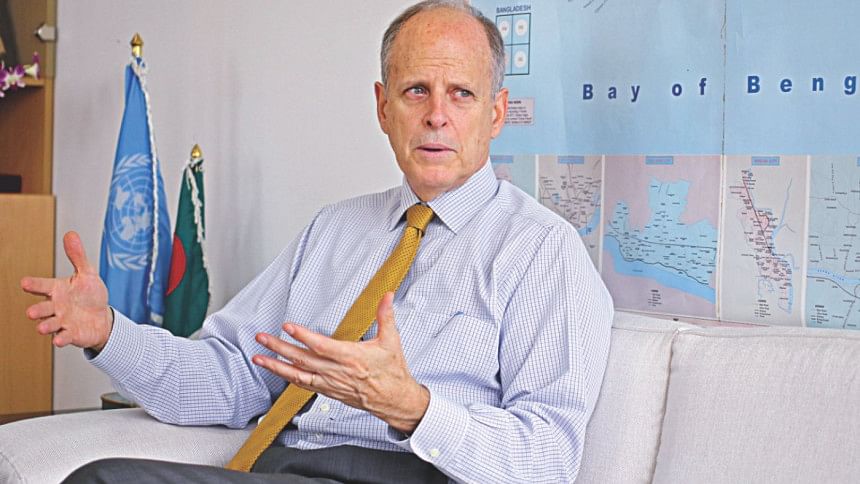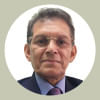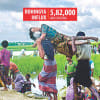Rohingya crisis a great test for UN

The ever-growing Rohingya influx is a crisis not only for Bangladesh but also for the region as well as the entire world, UN Resident Coordinator in Bangladesh Robert D Watkins has said.
Referring to the scale of the crisis, he said even the UN was facing a great test in helping Bangladesh to tackle the emergency.
"So far we are meeting the challenges, but we have no complete control of the situation for many reasons -- the sheer number, the speed with which they continue to cross the border and the challenges of trying to assist them in this very narrow piece of land, which is hilly," he told The Daily Star in an interview last week.
He lamented the lack of consensus at the UN Security Council to find a solution, and emphasised that those responsible for the crimes against the Rohingya population must be held accountable.
"The Security Council has met more last month to talk about Myanmar than in the last 10 years. It is quite remarkable. In spite of that, we are still having problem to get consensus from the Security Council on steps that need to be taken to try to solve this problem," said the UN head in Bangladesh.
A Security Council meeting in late September failed to make any decision on Myanmar because of opposition from China and Russia.
However, despite the lack of consensus at political level, there is absolute consensus that the UN has to intervene at humanitarian level. "We are doing everything within our power to ensure that needs of these people are met," he said.
But the lingering of the refugee crisis will adversely affect Bangladesh's economy, which is a big concern, he added.
"It will definitely have an impact. There is no question about that. And that's why we not only have to find a solution to the problem quickly, but also to minimise the impact on the economy."
The solution lies in the repatriation of the refugees to Myanmar given that peace and security is ensured there, said Watkins, adding that he did not think any solution would come in the next few months.
His comments come when some 589,000 Rohingya people -- about 60 percent of them children -- have crossed into Bangladesh since August 25 to join nearly 400,000 of their fellow countrymen who fled violence in Myanmar in phases over the years.
The UN and other aid groups are struggling to mobilise fund for the emergency reliefs.
Early this month, UN agencies appealed for $434 million for emergency assistance for six months, but received commitment of only $105 million or 24 percent so far.
The $434, for which the UN is going to have a pledging conference in Geneva tomorrow, is for food, shelter, water, sanitation and medicine, and will not cover the cost of Bangladesh government that is "pretty large", said Watkins.
Therefore, it is important to seek funds from financial institutions like the World Bank, IMF, ADB, and possibly OIC, he added. "We know that we won't have the resources and Bangladesh won't have resources so we are going to find extra resources from both sides."
Bangladesh is playing host to such a huge number of refugees when it is facing its own development challenges. Despite various measures, the yearly poverty reduction rate has dropped from 1.7 percent between 2005 and 2010 to 1.2 percent between 2010 and 2016.
According the Bangladesh Bureau of Statistics latest report, 24 percent people in Bangladesh are still poor (those unable to ensure daily food intake of 1,800-2,100 kilocalorie), and 13 percent of them are ultra poor (those unable to ensure daily food intake of 1,800 kilocalorie).
Slower growth in agriculture, drop in remittance inflow, lack of job opportunities, wealth inequality and challenges of reaching the hard-to-reach poor people were blamed for the slowing trend that goes against the UN's Sustainable Development Goals for 2015-2030 that speak of inclusive development.
Watkins said implementing the SDGs, which already faces financial challenges, would suffer further blows despite the fact that Bangladesh integrated the SDGs in its policies quite well.
"We hope the pledging conference in Geneva on October 23 will be an opportunity for other member countries of the UN to express solidarity with Bangladesh and the refugees and come up with financial contributions."
Asked about media reports that the UN office in Myanmar shelved its own report that was critical of the UN's approach there, he said the UN leadership in Myanmar was criticised for not advocating human rights issues more openly.
But in a country like Myanmar it is not always the best policy to criticise the government publicly, he observed.
"Sometimes you have to speak quietly to the right people to raise these issues," he said, adding that his UN colleagues in Myanmar followed that policy of dialogue with the government.
In spite of that, the UN was unable to prevent the violence. This, however, does not underline that the UN has not done enough, but the fact that Myanmar government or military already had decided to do what it did in response to the August 25 attack by Rohingya insurgents, he noted.
Asked if the UN needs reforms to make it more effective, Watkins said the discussions were very much there -- about expanding the number of permanent members and having representatives from developing countries.
He said the other aspect of discussion is if there can be some mechanism where decisions can be moved up to the UN general assembly from the Security Council in case of a deadlock like in the case of Myanmar.
The UN secretary-general is now focusing on administrative reforms whereby different UN agencies can work in a more coordinated way. Antonio Guterres will unveil some reforms in December.
"He has come up with some radical ideas of change. By next year, those will be enforced," Watkins added.
GOVERNANCE IS BIG CHALLENGE
Asked about the development challenges in Bangladesh's domestic front, the UN official, who has been posted in Dhaka for three years, said there were systematic corruption at all levels -- both low and high.
Comparing corruption in Bangladesh with traffic chaos in the capital, he said, "People just don't care about other people. They are just concentrating on themselves."
As there is a sense of impunity that there will be no consequences for corruption, corruption is going to continue. "It is really a lot more about changing attitude, the mindset.
"People have to take example that nobody is above law. Ministers, for instance, are to be held accountable for their actions. If there are cases of corruption, there has to be consequences.
"If people see that is happening, rules are happening for everyone, not just for the rickshaw pullers, but for the ministers or any others, then they will start abiding the rules. That's how you start changing the mindset of people… People at the top have to set the example.
"People now say why should I do it? This rich man gets away with it, the minister gets away with it, why should I follow the rules? And, that's where it starts -- people at the top have to set the example."
PARTICIPATION OF ALL
PARTIES IN POLLS IS KEY
But the real challenge that Bangladesh faces today in democracy is the issue of full participation of all the political parties in elections.
He said the problem in last election was that the main opposition party chose not to participate, and thus the democracy in Bangladesh is not fully reflective of all of the political parties in the country.
"That's why we have been working tirelessly with political parties and urging them to participate in next national elections. We will be working with the Election Commission to ensure that the elections take place in the most professional environment."
This way, parliament will reflect the whole spectrum of political opinions. "That's what we want more than anything else," said the top UN official.

 For all latest news, follow The Daily Star's Google News channel.
For all latest news, follow The Daily Star's Google News channel. 








Comments